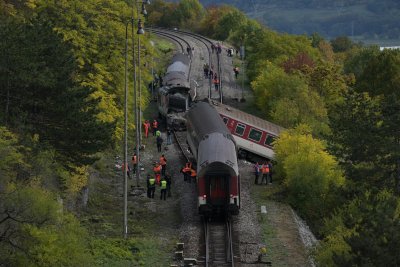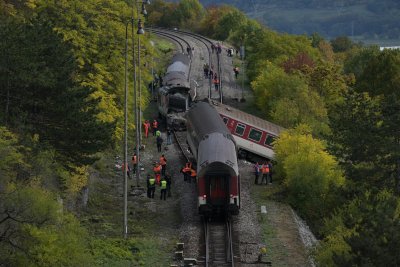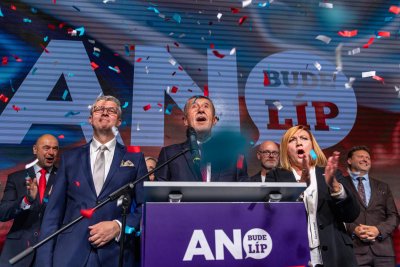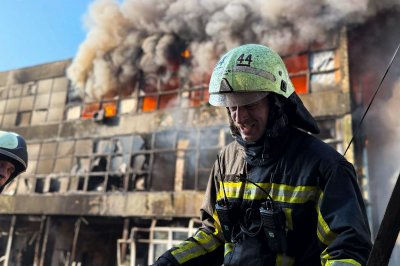1 of 2 | Andrej Babis (C), leader of the ANO party, celebrates Saturday at an election event in Prague, Czech Republic. He is poised to become prime minister with the party’s first-place finish and a coalition with other parties. Photo by Martin Divisek/EPA
Oct. 4 (UPI) — Billionaire Andrej Babis is poised to return to power as prime minister in the Czech Republic in a four-year comeback that mirrors U.S. President Donald Trump.
Known as “Czech Trump,” Babis earned a decisive victory Saturday in a parliamentary election after being voted out of office. Elections took place on Friday and Saturday.
Babis’ populist ANO party, which means yes in Czech, took 36% of the vote, which is the party’s best-ever result, according to Czech Statistics Office with about 95% of precincts counted.
Prime Minister Petr Fiala conceded defeat as head of the Spolu (Together) Party with 23% followed by the STAN liberal, centrist party. There was a turnout of 68.9% in a nation of 10 million residents.
“I’m surprised they received so many votes,” Babi said in Prague. “I didn’t believe it at first. I hoped we would reach 30%, as our poll suggested 26.”
No major Czech party will outright majority in the 200-seat lower house of Parliament. Only parties that win at least 5% of the votes can enter parliament.
Czech President Petr Pavel, who largely is in a ceremonial role, has said will begin forming a coalition on Sunday. Babis wants support from the far-right Freedom and Direct Democracy coalition and the populist Motorists party.
The Freedom and Direct Democracy captured 7.9% and Motorists 6.78%.
There could be a “a nightmare scenario for international, European partners” should Babis invite the right-wing parties to join the government, Daniel Hegedüs, director for Central Europe at the German Marshall Fund in Berlin, told The New York Times.
“There could be a huge reluctance to continue support to Ukraine, and to play the same constructive role in the European Union and NATO” as the Czech Republic has before, he said.
The 71-year-old former premier backs policies similar to Trump to spur economic growth.
He wants to cut taxes, increase pensions, cap energy prices, freeze politicians’ salaries and end funding for public television.
Babis capitalized on voter frustration with the current government’s response to a cost-of-living crisis. He also would promote the country’s place in Europe by focusing on transactional politics over values espoused by the EU.
Last year, he co-founded the Patriots for Europe, a right-wing main opposition party in the EU with Hungary’s Fidesz party, France’s Rassemblement National and Austria’s Freedom Party, both far-right groups.
Babis is riding a wave of populist politicians, including Prime Ministers Viktor Orban of Hungary and Robert Fico of Slovakia.
But unlike Trump and those leaders, Babis has never aligned himself with Russian President Vladimir Putin.
“Babiš is not an extremist but a dealmaker and populist who wants to have a catch-all party and he believes that he can offer something to everybody,” Petr Kolar, a former Czech ambassador to Russia, told the Financial Times before the vote.
“I don’t think Babiš will be against [more] sanctions” on Russia, adding “I believe that Babis is inspired by Orban, he admires him, but he doesn’t want to be perceived as a troublemaker in Brussels so much.”
Like those leaders, Babis has vowed to buck the EU on defense spending and immigration.
Babis became wealthy with an agribusiness with the fall of communism in Czechoslovakia in late 1989.
Czechoslovakia dissolved on Jan. 1, 1993, into Czech Republic and Slovakia.
Babis wants to resurrect the so-called Visegrad Four — the Czech Republic, Hungary, Poland and Slovakia — as a regional force uniting 65 million citizens for a better say in the 27-member EU. Czech Republic joined the bloc in 2004.
Czechoslovakia, Hungary and Poland at one time were communist nations, like the Soviet Union, which included Russia.
“We will never drag the Czech Republic to the east, never leave the EU or NATO,” Babis said in his last televised pre-election appeal to voters.
Pavel, a former NATO general, faced off against Babis in a 2023 presidential election won by Pavel.





